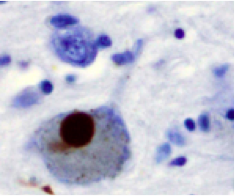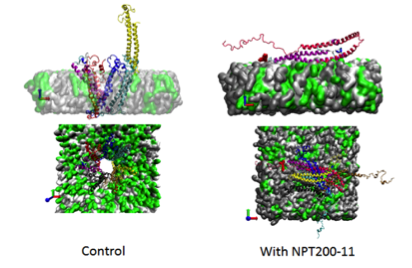Alpha-synuclein (ASYN)
Our most advanced therapeutic candidate (NPT200-11), is being developed for the treatment of Parkinson’s disease and related “synucleinopathies”. Parkinson’s disease is a common debilitating neurodegenerative disorder affecting 1 in 100 persons over 60 that is characterized by the accumulation of large aggregates of the misfolded synaptic protein alpha synuclein. Numerous findings, including those from human genetic studies (5, 6, 7) and from studies by our academic collaborators with transgenic animal models (8, 9, 10), demonstrate the key role of misfolded alpha synuclein in the pathology of Parkinson’s disease. Our novel molecules prevent the formation of toxic oligomeric aggregates of alpha- synuclein in cell membranes and also the consequent toxic effects of these aggregates on cell function (11). NPT200-11 has been shown to improve motor function and other markers of neurodegeneration in a number of different animal models of Parkinson’s disease (12). With our partner UCB we are currently advancing NPT200-11 through Phase I clinical trials.
 |
 |
 |
